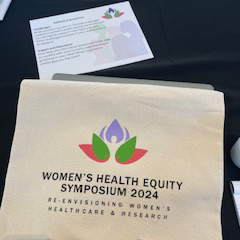
GRC’s Gabby Glenn Attends Women’s Health Equity Symposium
Gabby Glenn, MPH, GRC Senior Project Manager, attended the Women’s Health Equity Symposium at the University of Cincinnati on December 5-6, 2024. This two-day event brought together researchers, public health professionals, and advocates to discuss critical issues in women’s health, with a focus on equity and systemic change.
Gabby participated in sessions and conversations addressing maternal and child health, infant mortality, and obstetrics, especially as they pertain to marginalized populations. She shared insights from GRC’s SOARS project, which aims to host listening sessions with Black women who have experienced stillbirth. Through these discussions, Gabby built valuable connections with professionals, including those at Cradle Cincinnati, an organization focused on reducing infant mortality. These relationships hold promise for aiding recruitment efforts for the listening sessions central to the SOARS project.
“The symposium offered an incredible opportunity to connect with others working to advance health equity. I’m particularly excited about collaborating with a medical anthropologist from the University of North Carolina who shared ideas for enhancing the SOARS action guide for physicians,” said Gabby.
The symposium covered a wide range of public health topics, from equitable funding and structural racism to the intersection of health and systems like housing, food, and education. Gabby found the discussions about food and nutrition especially insightful, as this is an area of public health where she had limited expertise. She was inspired by the emphasis on holistic systems thinking and the critical leadership roles Black women play in addressing health inequities, despite often being the most impacted by them.
Gabby left the symposium with new knowledge and partnerships that will inform her work at GRC. She reflected, “Attending this event reinforced the importance of using inclusive language in reproductive healthcare and thinking creatively about how different systems influence health outcomes.”


